Source: Baijing Chuhai
Authors: Zhao Siyao, Zhang Kairan

Image Source: Generated by Wujie AI
Before the holiday, a by-invitation-only instant camera photo app called Lapse topped the US charts. Lapse is not a new app, and it experienced rapid growth in 2022. When the editorial department had not yet figured out the reason for this rapid growth, after the 8-day holiday, another old app, Epik, replaced it and topped the overall US iOS download chart (ranked second on October 8). Epik's performance on Google Play was not as impressive as on the iOS platform, and as of the deadline (October 8), it was ranked 24th.
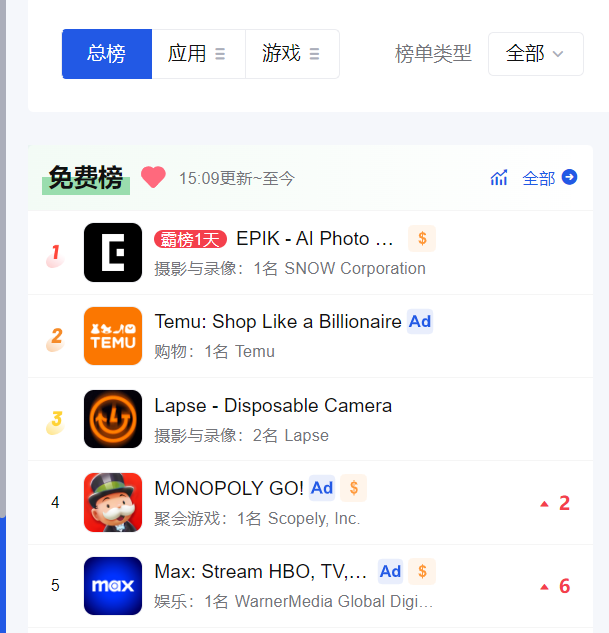
EPIK US iOS download ranking (10.7) | Source: Dots Data
The reason for Epik's sudden popularity is not difficult to infer, and the trend of climbing the charts was already evident before September 30.
This time, it's the school yearbook
Although Epik's download ranking in the US started to rise steadily around September 30, according to Dots Data, as early as a week before, on September 23, Epik's global revenue showed a growing trend, with revenue exceeding 2 million US dollars (approximately 14.6 million RMB) in the two weeks leading up to September 7.
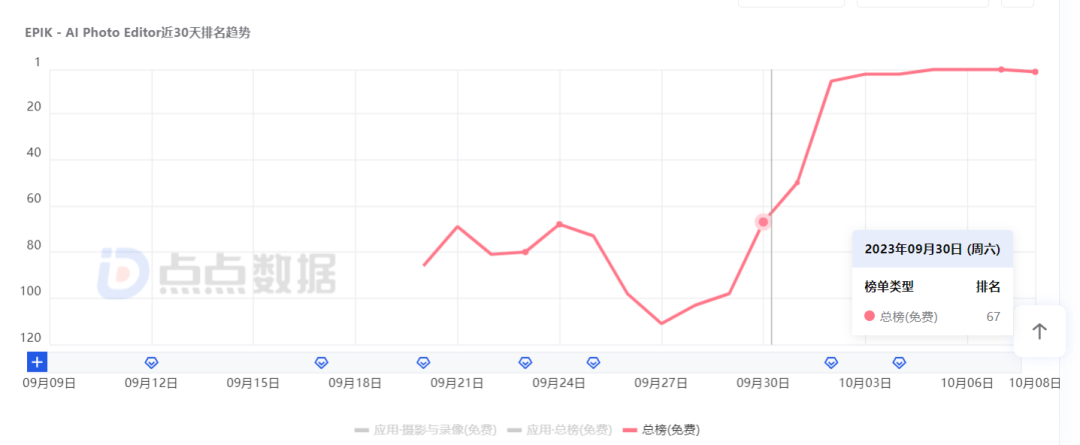
Epik's ranking changes in the US iOS download chart | Source: Dots Data
At the "starting point" of the revenue growth, Epik made an update, introducing an AI feature to create 90s-style school yearbook photos.
This is a paid feature. Users upload 8-16 selfies, choose the gender of the person, and the system will generate up to 60 American-style retro school yearbook photos for the user, which is quite a large quantity compared to similar apps. The generated photos mostly have a deep blue background, with a large grainy texture and a layer of retro filter, similar to the vintage camera apps that have frequently appeared on the charts in recent months. The user's image in the photos is in a 90s style, with headbands, leather jackets, and brightly colored armpit bags, exuding a strong sense of the era.

Caption: 3 different styles of school yearbook photos generated by EPIK for music lovers, formal dressers, and sports enthusiasts
The price for generating photos at normal speed is $5.99, and users can receive the finished photos within 24 hours. Epik also offers an option for expedited photo generation within 2 hours, priced at $9.99.
When testing the school yearbook photo feature, the author would often encounter pop-ups indicating that the AI Yearbook was full or the regular purchase was sold out. This is undoubtedly related to the server being overwhelmed by too many users, but it does not rule out the possibility of developer-driven marketing.
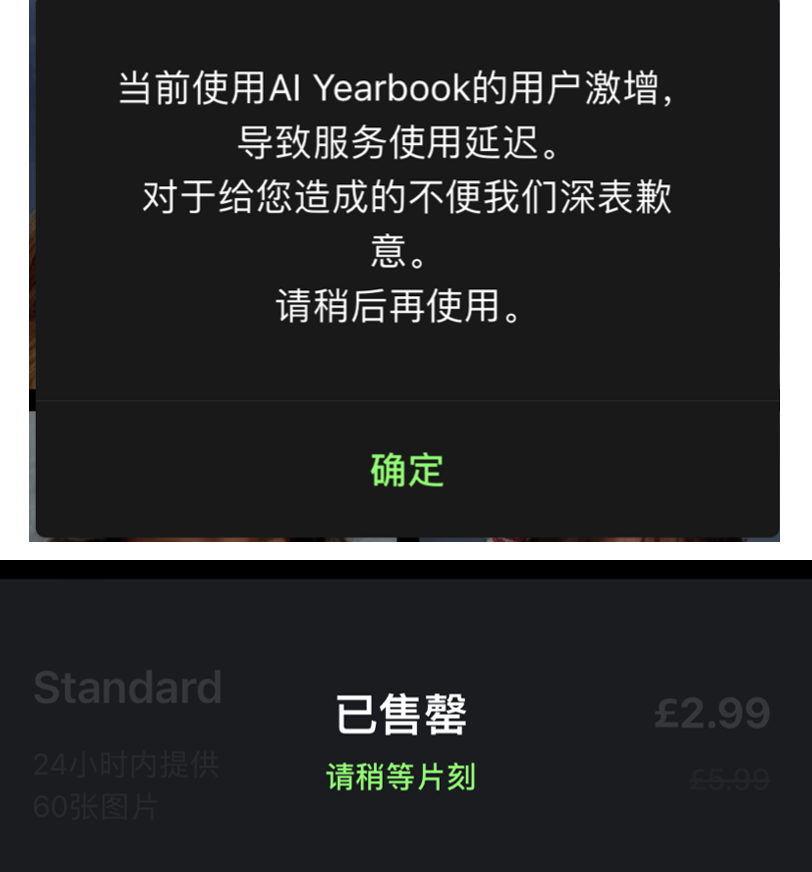
To further encourage users to use other features of Epik, the app also launched a promotion where the school yearbook photo generation feature is discounted after a regular subscription. If users subscribe weekly/monthly/yearly, the regular option for generating school yearbook photos will only cost $2.99.

According to Dots Data's display of Epik's in-app purchases in the US, among all paid orders, the number of orders enjoying discounts on the school yearbook feature through subscriptions exceeded 5%, and this "bundled" sales approach also converted some more valuable subscription users for Epik. In addition, after September 23, the highest sales volume still came from the AI yearbook feature, accounting for 26.17%.
Combining the two sets of data, the AI yearbook feature has exerted a very strong appeal to users.
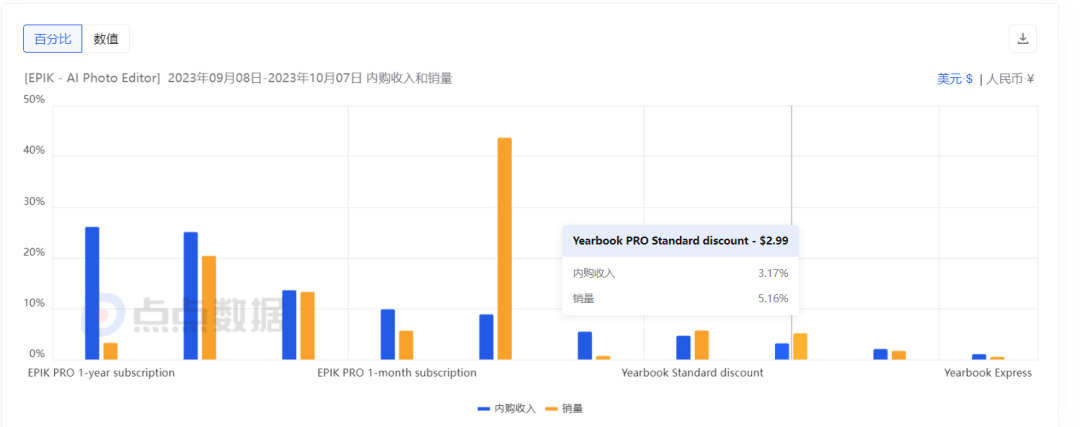
Source: Dots Data
Why the school yearbook? And why did a Korean company accurately capture the pulse?
School yearbooks exist in schools around the world, but they are particularly common in American school culture. School yearbooks are produced by students and school staff, printed annually, and mainly used to record students' campus life and reflect the school's rich club activities. To put it more bluntly, students' campus highlights usually appear in school yearbooks. For example, Alice was the champion of the high school beauty pageant, Luis was a member of the high school basketball team, and Mark was particularly good at playing the electric guitar during his student days.
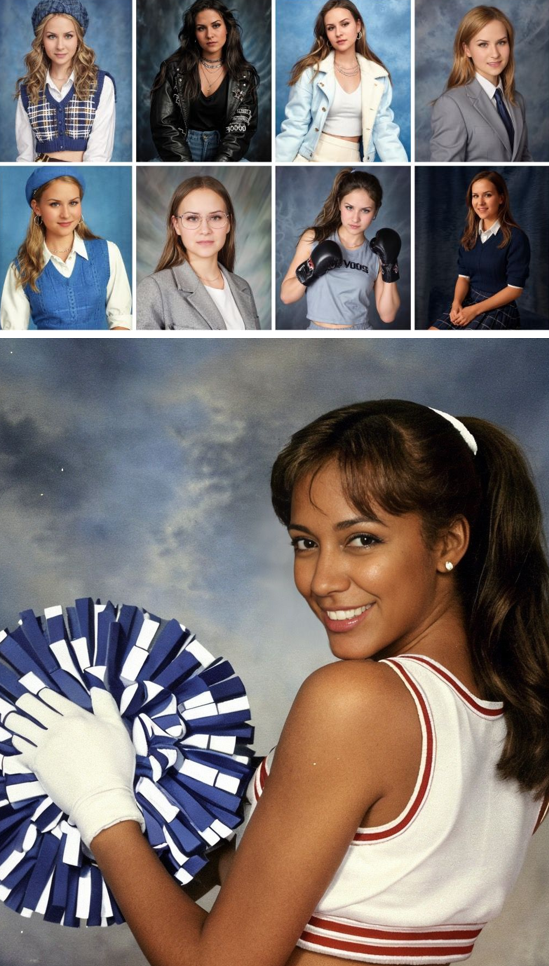
Compared to regular ID photos or portrait photos, school yearbooks can showcase a person's personality and achievements in addition to their appearance, coupled with the neutral background, curly hair, bright leather jackets unique to the 90s, and the innocent smiles and abundant collagen of high school students, it's hard not to evoke nostalgia in adults who are now in middle age or struggling in the workplace.
An early-stage investor active on X (formerly Twitter) made an interesting comment on the phenomenon of Epik's school yearbook going viral. He believes that all successful toC products are built on human "seven deadly sins" (not specifically referring to religious sins, but broadly referring to some behaviors that may lead to "corruption"), such as Instagram capturing people's envy, Tinder capturing people's desire, and DoorDash capturing people's greed for food.
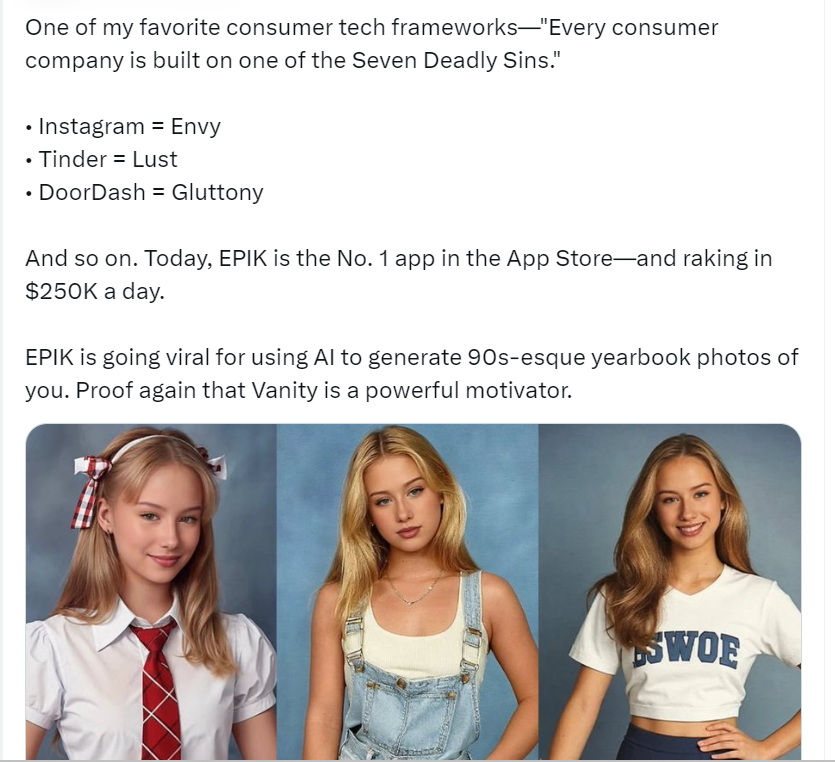
Source: X.com
Epik actually taps into people's vanity, and perhaps also a sense of powerlessness entwined with reality, so the school yearbook has driven Epik to achieve impressive results in the culturally rich US market. However, looking back at the Korean company SNOW Corporation behind the app, and the fact that the app initially gained momentum in the Korean market and only moved to the US market after the AI yearbook was validated, the accurate pulse of the trend by the Korean company is also worth pondering.
From EPIK's growth trajectory, it can be seen that after the new feature was launched on September 23, the downloads and revenue in the Korean market first increased in sync. Many KPOP stars posted on social media to try out EPIK's school yearbook feature. However, EPIK's growth momentum in Korea did not continue, but rapidly declined within 3 days after reaching its peak in downloads on September 30.
After validating in Korea, EPIK quickly shifted its focus to the United States. According to Guada, before and after the increase in downloads in the US, EPIK did not have a large number of advertising placements, but relied more on collaborations with KOLs for promotion on social media. TikTok and Instagram are the main platforms for EPIK.
The preheating content on TikTok actually began to appear concentratedly on September 19, and the content and format of the videos were similar. KOLs would upload a selfie video and pose a question, such as "What would I look like in the 90s?" Then the camera would switch to showcase multiple photos generated by AI, highlighting the effects of the school yearbook feature of EPIK.
According to a post by Youngjae Woo, the head of EPIK's commercialization team, after the well-known DJ and music producer Alan Walker posted about the school yearbook on Instagram and TikTok, it gained a lot of attention.
There is a clear dividing line: the official KOL social media content mostly appeared before September 29, which is about 10 days into the marketing, and after that, the content was mainly from regular users. By this time, the preheating and KOL marketing of EPIK had already started to take effect.
Starting from October 1, EPIK's performance in the United States began to rapidly and steadily rise.
As for the driving force behind Snow Corporation, it has previously launched selfie app B612, Snapchat-like AR camera app Snow, and a food beautification app called Foodie.
Snow Corporation, as a subsidiary of Naver, South Korea's largest internet company, is quite powerful. Since its establishment in 2016, Snow Corporation has only received investment three times, including strategic investments from Naver and Line, as well as Series A financing involving SoftBank and Sequoia China. Despite this, as a South Korean company, Snow Corporation's ability to consistently produce hit products in mature markets such as the United States and Japan after B612 and Snow, indicates that the company itself has a certain strength in understanding user needs and product development.
The reason why Snow Corporation was able to find the entry point of the school yearbook is a somewhat speculative interpretation. According to a social media post by Youngjae Woo, the commercialization team at Snow Corporation has been paying attention to the changes in features of various photo apps. The team noticed this when Remini experienced another growth phase in July with its AI feature that takes users back to their childhood. Combined with the trend of "retro nostalgia" that has been popular in fashion, photography, and social media apps since 2023, it was reasonable for the development team to consider creating a product that combines these elements.
Although the school yearbook is a typical American cultural product, there are similar phenomena in Korea. In Korea, in addition to taking class photos like in China, each student also takes individual photos in school uniforms, and the school keeps the class photos in albums. Many Kpop stars have been exposed with their student photos after their debut. Although the student albums in Korea are different from the school yearbooks in the United States, it is probably easier for overseas companies to think of this entry point.
How long can EPIK stay popular?
From the introduction on Snow Corporation's official website, it can be seen that EPIK is different from its previous photo and video apps. Other apps have a main focus, such as selfies, creating social media avatars, or beautifying food, while EPIK is defined as a comprehensive AI photo app, which means that EPIK will provide many features, which is different from the single-threaded operation habit of European and American users. Behind this, Snow Corporation has also put in a lot of effort.
1. Prominent focus on key features
In coordination with EPIK's icon, the entire app is mainly in black and white, divided into 3 main menus: editing, templates, and store. The home page is the editing menu, with over half of the screen scrolling to showcase EPIK's popular features, such as the 90s school yearbook, AI hairstyles, and announcements of limited-time discounts for subscriptions, with other EPIK features below, allowing users to quickly grasp the key points.
2. Respecting the content browsing habits of local users
The templates main menu is actually a UGC community. In this section, EPIK uses a double waterfall layout similar to Pinterest to display templates. These templates mainly showcase UGC content. When users see a post they like, they can directly click "use" in the waterfall to create the same, or they can further view details, follow the poster, or save the template. After viewing the template details, users do not need to return to the previous level, but can continue to browse UGC content by scrolling up and down, similar to TikTok.
Through UGC content in this menu, on the one hand, it creates a community atmosphere, and on the other hand, it motivates users to discover more interesting templates.
To cater to users with more specific purposes, EPIK also set up search and submenus at the top of the templates menu, allowing users to quickly find templates based on their needs, such as for making ins stories, instant camera photos, or phone wallpapers, for use in birthday or date scenes, or to create an autumn or retro atmosphere, and so on.
3. Clearly categorizing paid templates
If the design of the home page and template menu hides the operator's intentions to increase user activity within the app, the design of the Store section is more neat and secure. EPIK has categorized the templates into more conventional categories, including filters, effects, stickers, and fonts, allowing users to quickly find what they need. Although the Store interface displays only paid templates, clicking into it actually leads to the editing interface, where users can choose any free or paid templates.
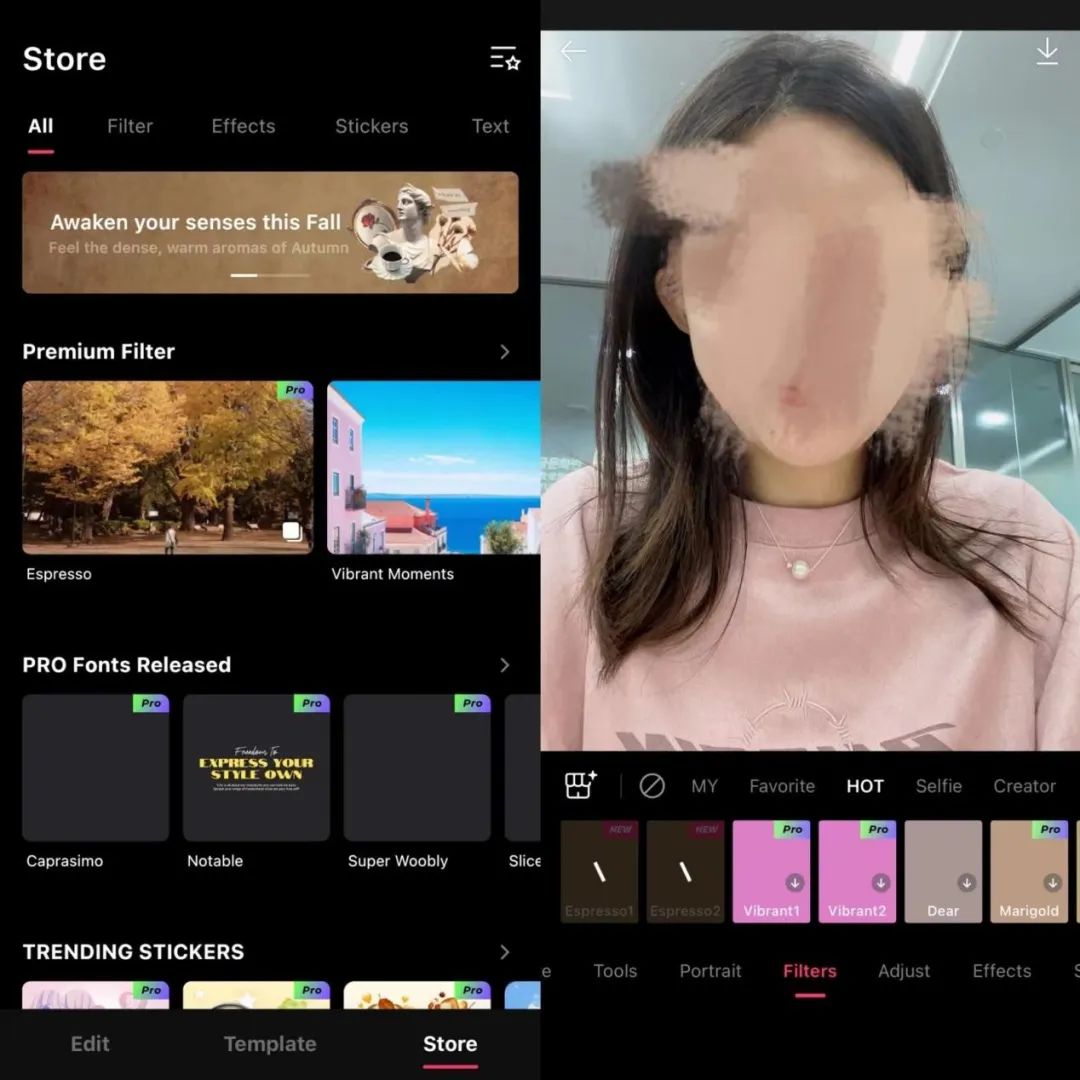
Compared to some domestic photo editing apps that have gone overseas, EPIK, although comprehensive in functionality, has a clear focus, especially in the avoidance of the habitual thinking of "wanting to showcase everything" on the home page, a design that may better suit the app usage habits of European and American users.
It is obvious that EPIK hopes to acquire customers through the AI school yearbook feature, and then promote user retention through its comprehensive other features, which is the development path for many photo apps that have become popular through a single feature. A typical example is Lensa AI, which became popular at the end of 2022 with its magical AI social media avatar feature, and Remini, which became popular by restoring old photos. These two apps also have differences, with Lensa making a lot of money in the short term but then falling silent, while Remini has repeatedly gained attention through continuous feature updates, maintaining high revenue levels despite some decline.
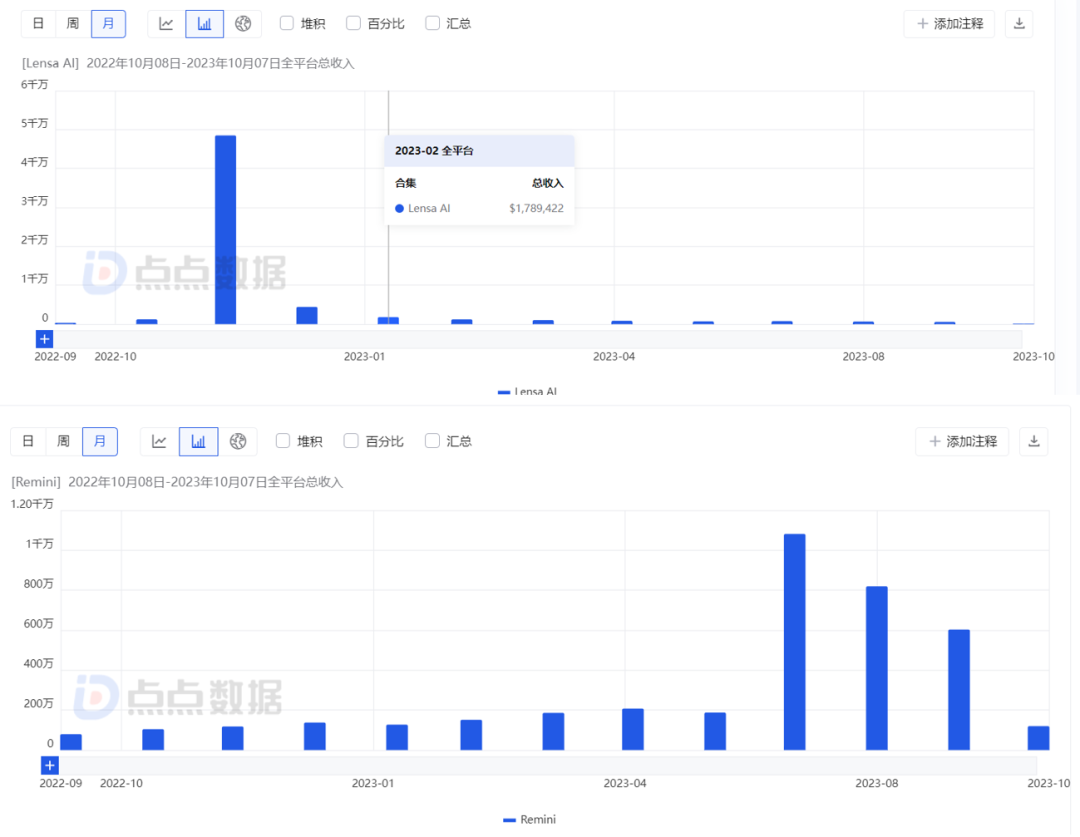
Global monthly revenue changes for Lensa (top) and Remini (bottom) in the past year (September revenue still around $6 million, October only has a few days of data) | Source: Dots Data
At present, I cannot make a judgment on the future development of EPIK. However, EPIK has already shown several characteristics.
First, compared to Lensa, which introduced more features after its AI social media avatar feature became popular, EPIK had already prepared more editing features to attract users before launching its hit feature. Lensa gained attention in December 2022, and according to Dots Data, the 30-day user retention for the iOS version in the US was below 1.5% in December. EPIK had a 3.6% 30-day user retention on iOS in September, but lower than Remini's 4.84% when it first gained attention in July 2023.
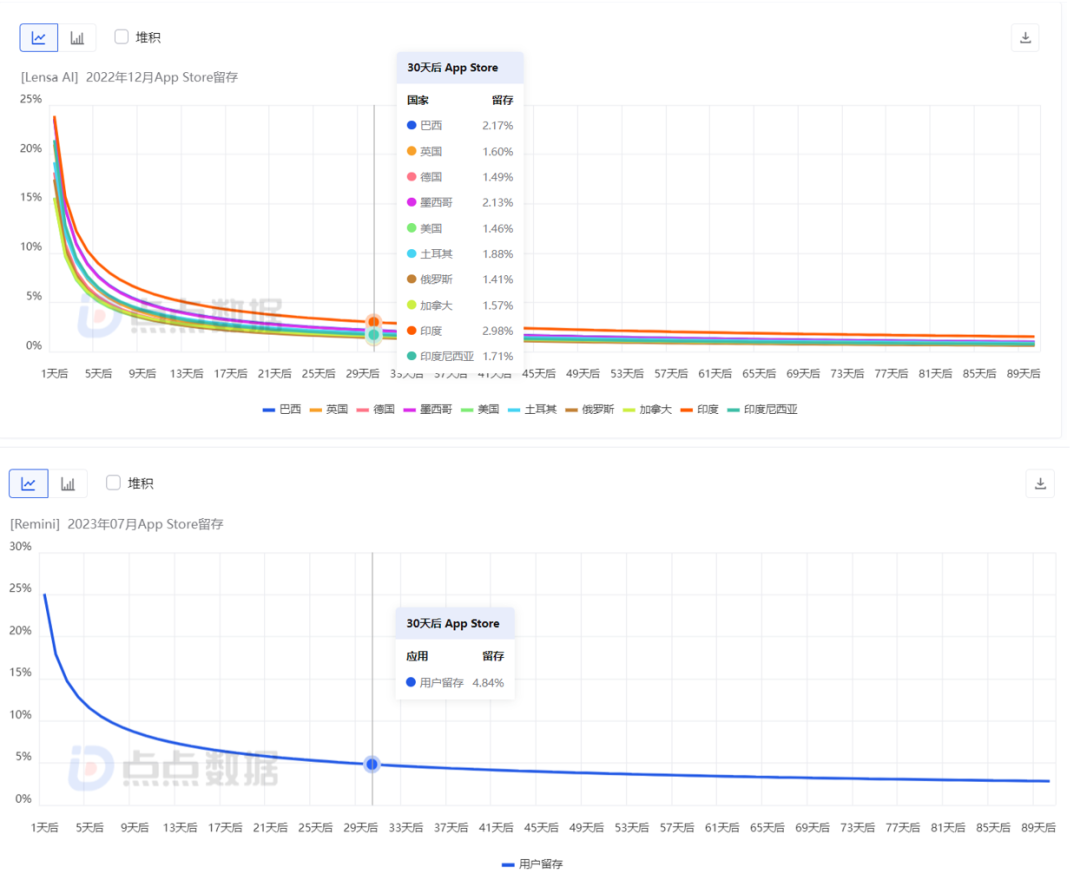
Lensa's 30-day user retention in December 2022 (top) vs. Remini's 30-day user retention in July 2023 (bottom) | Source: Dots Data
Second, based on user in-app purchase behavior in the past month, the highest revenue contribution for EPIK comes from annual subscriptions and the rush service for school yearbook photos, with the latter accounting for 20% of total paid orders. This leads to a reasonable inference that EPIK's revenue will rapidly decline after the AI school yearbook trend passes.
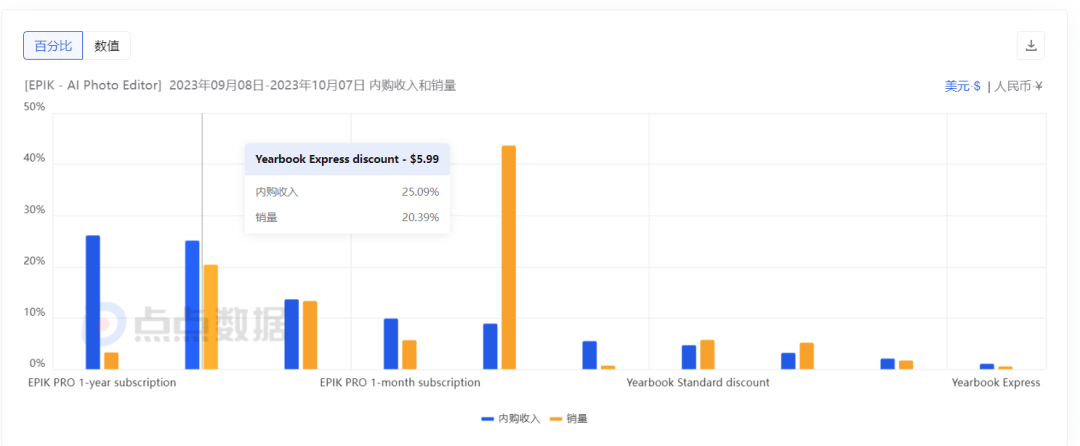
As for the future development trend of EPIK, we welcome discussions in the comments section. But regardless of what happens to EPIK in the future, there are already AI companies, such as AppNation, starting to "pay tribute" to the school yearbook feature, and even making it to the top of the overall iOS chart in the US.
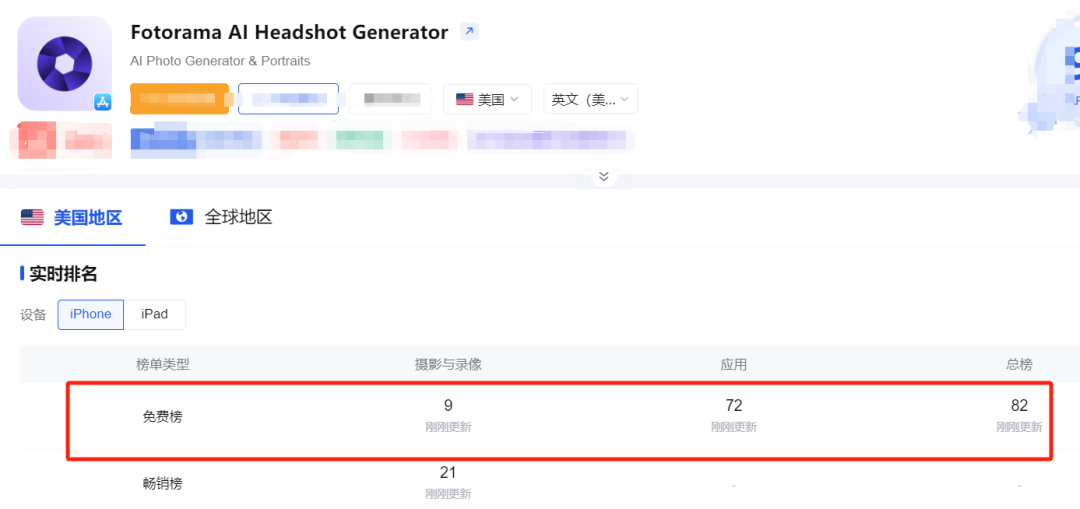
免责声明:本文章仅代表作者个人观点,不代表本平台的立场和观点。本文章仅供信息分享,不构成对任何人的任何投资建议。用户与作者之间的任何争议,与本平台无关。如网页中刊载的文章或图片涉及侵权,请提供相关的权利证明和身份证明发送邮件到support@aicoin.com,本平台相关工作人员将会进行核查。



